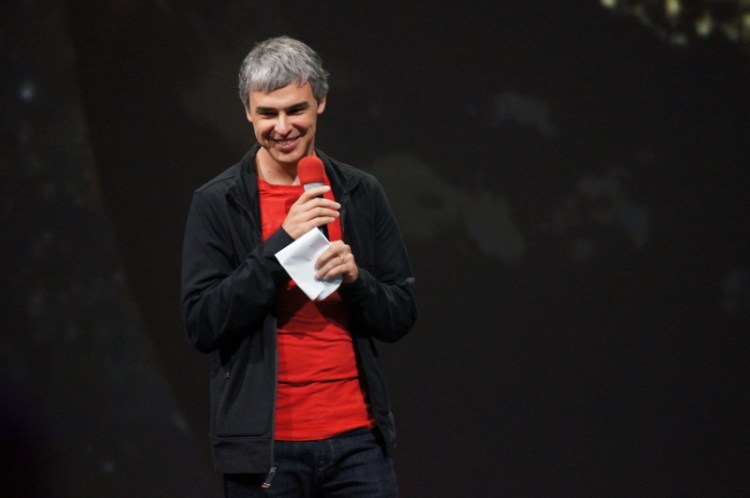Genetics is in Google’s DNA
Page, who has taken the lead on announcing Calico, suffers from a health problem that makes it difficult for him to speak and breathe on occasion. Earlier this year, he was diagnosed with left vocal-cord paralysis, a condition that restricts vocal-cord movement.
Meanwhile, Brin has a strong affinity for the fields of medicine and genetics. He regularly networks with some of the brightest minds in the science and research communities.
Brin recently separated from his wife, Anne Wojcicki, who is the founder of personalized genomics company 23andme. Over the years, Google made some sizable investments in 23andme. Brin will likely remain an outspoken supporter of the company, as Google’s financially tied to it. 23andme has a goal to spread to one million people and create the world’s largest database of genomic data.
In February, Brin put his own money into health, joining Facebook’s chief Mark Zuckerberg, Yuri Milner and Levinson to sponsor a prize for breakthrough research in the life sciences. The goal of this initiative is to fund research to find cures for diseases and extend human life. (Sound familiar?)
Geneticists say the timing for the prize is just right, given the strides in gene sequencing technologies in the last decade. It’s now cheaper than ever to sequence the genome. Human geneticist and biotech entrepreneur Dietrich Stephan recently told me that he predicts that it will be commonplace for babies to have their genomes sequenced at birth.
That’s a lot of genomic data, which is potentially rich with information about the root cause of diseases like Parkinson’s and Alzheimer’s. People could also use this data to develop more targeted treatments for various medical conditions (studies have shown that adverse drug events [ADEs] result in more than 770,000 injuries and deaths each year and cost up to $5.6 million per hospital) and help shape public health policy.
Another influence, who may have played a role in Calico’s formation, is so-called “restless genius” Ray Kurzweil. He is one of the most outspoken proponents of antiaging technologies and one of Google’s most prominent recent hires. It’s not clear yet whether Kurzweil will join the Calico team. However, a source familiar with the matter told me it’s very likely he’ll serve as an adviser of sorts.
Why is Calico a separate entity?
Google has made strides in other areas of health care — not just genetics. We’ve seen Google build up its data science talent and make strategic investments in health care startups via its investment arm, Google Ventures. Google Glass, its much-hyped wearable tech device, is already being positioned in the press as a useful tool for primary care physicians and surgeons.
Given its proclivity for health care, it’s somewhat surprising that Calico has been set up as a separate venture. The office will be most likely located somewhere in the San Francisco Bay Area, nearby but not inside Google’s Mountain View headquarters.
Kranser suggests that one factor might be to shield Google from regulatory issues. Google is not a biotech company, nor does it want to be perceived as such. Biotech companies have to deal with regulatory agencies in Washington, D.C., including the Food and Drug Administration (FDA).
In addition, by positioning Calico as a separate company, it will invite fewer comparisons to Google Health, which was one of Google’s few abject failures.
What does this mean for health entrepreneurs?
Entrepreneurs are buzzing about Google’s foray into health care, which will draw yet more attention to digital health.
Tripp has been tracking Google’s emergence in health care for some time. He credits the company as the leading expert on “data sets and big prediction” and believes that Google’s technology has the potential to save lives when applied to public health problems.
Lauren Fifield, a senior policy researcher at health record startup Practice Fusion, agrees. She believes that aging and health care has been largely overlooked by private companies — hence, there are few marketable drugs in sight.
It’s a shame, given that tackling age-related diseases could be critical to reducing health care costs and refocusing our medical system on quality of life and value of care. This is, after all, the primary goal of the Affordable Care Act.
Fifield is curious to see whether Google will take the “cool” approach by analyzing data gleaned from devices, like Apple’s iPhone or Google Glass, or it will “go for the real impact play.”
Fifield hopes Google will be the first big tech company to opt for the latter. Few policy-makers and companies today are prepared to face (let alone alleviate) how unprepared both individuals and clinicians and families are to make decisions about death and aging.
We expect that Google will make more announcements about Calico in the next few months, and will keep you posted. Does Google have a shot at fighting aging? Let us know in the comment section below.


